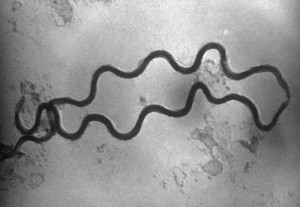San Antonio syphilis epidemic called a ‘terrible plague’
The number of syphilis cases in San Antonio and Bexar County, Texas continues it’s rise, according to the latest data from the San Antonio Metropolitan Health District (Metro Health) Mar. 31.
The total number of syphilis cases increased 15.2 percent in 2013, with 1,070 reported cases compared to 929 in 2012, the preliminary data demonstrates.

Treponema pallidum Photo/CDC
In addition, concerning congenital syphilis in the county, despite the number of cases decreasing by one from the previous year (The number of congenital syphilis cases in 2013 went down from 18 to 17), the rate of congenital syphilis in Bexar County in 2013 remains 8 times higher than the 2012 national average and is the highest rate among the large urban areas in Texas.
Other 2013 data from the Metro Health include the rate of primary and secondary syphilis infections in men was six fold that of women. The prevalence of primary and secondary syphilis in African-Americans was 3.3 times higher than in Hispanics and 2.7 times higher as compared to white, non-Hispanics.
“San Antonio’s syphilis epidemic is now in its ninth year of continuous growth. The 17 babies born with congenital syphilis in 2013 are exceeded only by the 18 babies born in 2012. Only a deeply committed collaboration between Metro Health and local health care practitioners can halt this terrible plague,” said Dr. Thomas Schlenker, director of Metro Health. “Metro Health will apply new resources to reach high risk populations, will initiate mobile screening and treatment in the field, will offer school-based instruction and will case manage thru birth all pregnant women who present to the Metro Health STD Clinic.
“In addition, we ask each of the 12 local birthing hospitals to document for 2013 what proportion of the women who delivered were tested for syphilis during their third trimester, to set improvement goals for 2014 and to implement a plan suitable for their institution to reach those goals.”
Syphilis is a sexually transmitted infection (STI) caused by the bacterium, Treponema pallidum. The most common way to get syphilis is by having sexual contact (oral, genital or anal) with an infected person. The secondary lesions are also infective and contactwith them could transmit the bacteria. It can also be transmitted from an infected motherto her baby (congenital transmission).
Syphilis goes through four stages that can overlap:
Primary Syphilis
The first symptom of primary syphilis is frequently a small, round, firm ulcer called a chancre (pronounced “shanker”) at the place the bacteria enters the body (usually the penis, vulva or vagina, but it may appear on the cervix, tongue or lips). There is usually just one chancre, however there can be many. Swollen lymph nodes in these areas are common.
The chancre usually appears in about 3 weeks after infection, but can occur anytime from 9-90 days after infection.
Because chancres are painless and can occur inside the body, you may not notice it. It disappears after 3-6 weeks whether you are treated or not. If primary syphilis goes untreated, it then moves into the secondary stage.
Secondary Syphilis
The most common symptom of this stage is a non-itchy rash. The rash is usually on the palms of the hands (see below) and soles of the feet, it can cover the whole body or only a select few areas. This occurs 2-10 weeks after the chancre heals. Other common symptoms are sore throat, fatigue, headache, swollen glands and less frequently hair loss and lesions in the mouth.
Much like primary syphilis, secondary syphilis will disappear even without treatment. If untreated it goes into the latent and tertiary stages.
Does having a sexually transmitted infection have you feeling like no one understands you? Believe me, you are not alone, there are thousands of people just like you, and you can meet them at the #1 community for STD dating and support, PositiveSingles.com.
Latent Syphilis
This is the hidden stage of syphilis. At this stage there are no symptoms. This stage can last for weeks or decades.
Early latent syphilis is still an infectious stage and you can transmit the disease to your partner. In late latent syphilis, the risk of infecting a partner is low or absent.
Signs and symptoms may never return or if untreated it goes into the most serious stage, tertiary syphilis.
Tertiary Syphilis
Even without treatment only a minority of infected people develop these horrible complications. In this stage, the bacteria will damage the heart, eyes, brain, bones, joints and central nervous system. This can happen decades after the initial infection. This can result in blindness, deafness, memory loss, heart disease and death. Neurosyphilis is one of the most severe signs of this stage.
Congenital syphilis can results in miscarriages, premature births and stillbirths. Some infants with congenital syphilis have symptoms at birth, but most develop symptoms later. Sores on infected babies are infectious so holding and kissing infected babies could transmit the disease.
It is very easy to detect early stages of syphilis through blood tests that detect antibodies.
It is easy to treat syphilis in the early stages with one injection of Penicillin. Later stages or neurosyphilis may take daily doses given by IV in a hospital. It is important to note in late syphilis, any damage done to organs cannot be reversed.
Having a syphilis chancre can increase the transmission of HIV up to 5-fold.
To reduce your risk of syphilis and other sexually transmitted diseases, practice safe sex:
• Avoid sex, or have mutually monogamous sex with one partner who is uninfected.
• Talk with your sex partners about your HIV status and history of other sexually transmitted infections.
• If you don’t know the STI status of your partner, use a latex condom with each sexual contact.
• Avoid excessive use of alcohol or other drugs, which can cloud your judgment and lead to unsafe sexual practices.
With nearly 800,000 members, PositiveSingles.com is the place to be for singles and friends with STDs. As the most trusted and anonymous online dating site in the world for people with herpes, HPV, HIV and every other STD, PositiveSingles.com is the community where can get on with your life and meet new friends, partners or potential spouses. Information about STD medical treatments and information is available, and there is always someone to talk to or offer help and advice and they really understand because they walk in your shoes.















[…] San Antonio syphilis epidemic called a ‘terrible plague’ […]